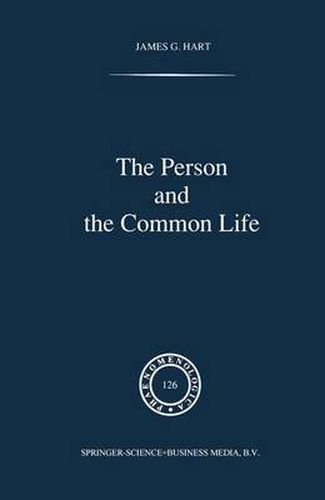Readings Newsletter
Become a Readings Member to make your shopping experience even easier.
Sign in or sign up for free!
You’re not far away from qualifying for FREE standard shipping within Australia
You’ve qualified for FREE standard shipping within Australia
The cart is loading…






This title is printed to order. This book may have been self-published. If so, we cannot guarantee the quality of the content. In the main most books will have gone through the editing process however some may not. We therefore suggest that you be aware of this before ordering this book. If in doubt check either the author or publisher’s details as we are unable to accept any returns unless they are faulty. Please contact us if you have any questions.
The Husserl-based social ethics claims that the properly philosophical life - ie one lived within the noetic-noematic field - is not cut off from action. Indeed, the ethical and political dimensions of the person are disclosed through various reductions. At the passive-synthetic level as well as at the higher founded levels of personal constitution a basic sense of will emerges, the telos of which is a godly intersubjective self-ideal. This truth of will is inseparably an ought and an is involving moral categoriality as a way of letting the good of others be part of one’s own. Both moral categoriality and the polis actuate the latent first-person plural dative of manifestation which emerges with a common world. Thereby they actuate also senses of the common life which can develop to community as a higher-order person. This leads to a eutopian anti-statist theory of the polis and common good which has affinity with some communitarian-anarchist and Green views.
$9.00 standard shipping within Australia
FREE standard shipping within Australia for orders over $100.00
Express & International shipping calculated at checkout
This title is printed to order. This book may have been self-published. If so, we cannot guarantee the quality of the content. In the main most books will have gone through the editing process however some may not. We therefore suggest that you be aware of this before ordering this book. If in doubt check either the author or publisher’s details as we are unable to accept any returns unless they are faulty. Please contact us if you have any questions.
The Husserl-based social ethics claims that the properly philosophical life - ie one lived within the noetic-noematic field - is not cut off from action. Indeed, the ethical and political dimensions of the person are disclosed through various reductions. At the passive-synthetic level as well as at the higher founded levels of personal constitution a basic sense of will emerges, the telos of which is a godly intersubjective self-ideal. This truth of will is inseparably an ought and an is involving moral categoriality as a way of letting the good of others be part of one’s own. Both moral categoriality and the polis actuate the latent first-person plural dative of manifestation which emerges with a common world. Thereby they actuate also senses of the common life which can develop to community as a higher-order person. This leads to a eutopian anti-statist theory of the polis and common good which has affinity with some communitarian-anarchist and Green views.